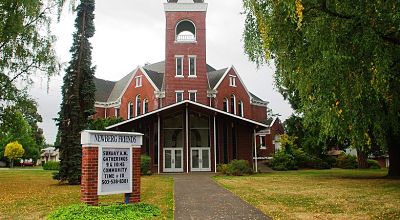Government Finds Backdoor to Tax Churches and Nonprofits
While the federal government and the Catholic Church wrestle over health-care provided contraception and abortions, city and county governments may have found a rather unique method of backdoor taxation on nonprofits. They simply double the water bill for all churches and schools. In a court case that is being carefully watched by churches and nonprofits across the nation, an Oregon judge will soon decide if the practice is valid.
One of the 600-plus ordinances for the city of Canyonville, Ore., states that “churches, schools and nonprofits like our local YMCA and a nonprofit senior residence will be charged double the normal water rates and substantially elevated sewage fees.” One of the current ordinances explains that the surcharges are to be paid “in lieu of taxes.”
Meanwhile, a sign, proudly posted in the city building, tells Canyonville residents that they pay less on their water bills than neighboring towns. The nonprofits, who are paying double, say that their surcharge is the reason.
Canyonville Christian Academy (CCA), founded in 1924, stumbled onto the double billing, finding that the extra surcharges date back three decades and may total close to $200,000. Said the school headmaster, Cathy Lovato, “We offered to settle this for a very modest amount last Christmas but the city said no.” The school, which operates on a modest budget, once voted to shut its doors in 1995. Alumni and friends donated money to help the school rebound.
Although the ordinances are written to broadly cover all nonprofit water users, CCA believes that the city regulations have principally targeted 10 churches and four Christian schools with the biggest bill going to the Canyonville Christian Academy.
Last June CCA notified the city government that it had discovered the improper billing but according to the Academy nothing has been done to fix the problem. According to CCA, the city has held four executive/closed council meetings with their legal counsel present.
School officials say that the school has consulted with the Oregon Attorney General, a state legislator, multiple mayors of other cities and multiple law firms. Lovato said, “To my knowledge, no one has advised CCA that the double charges on churches and church schools are legal. Many seem to believe that this is a clear violation of the U.S. Constitution.”
On October 19, CCA offered to resolve the issue by taking a small fraction of the amount of overcharges of the last six years in the form of credits on future bills. Of course, the school also asked that the city desist in the double charges. According to Lovato, the city notified the school on December 13 that their offer was rejected. Meanwhile, the surcharges on nonprofits by the city continues and is reflected in the most recent water bill mailed to CCA this month.
“We asked a senior city official a year ago about the rationale and legality of the surcharges, and why they were doing this and he replied, ‘We do it because we can.’” Lovato said. Canyonville is a small town in southern Oregon with a population of 1,700. CCA has appealed to the Douglas County Circuit Court in Roseburg, Ore., to give a ruling on the issue.
If the court upholds the city government, it may provide other city and county governments with a backdoor method of taxation on churches and nonprofits. The case is likely to be carefully monitored by churches and nonprofit lawyers nationwide.














































